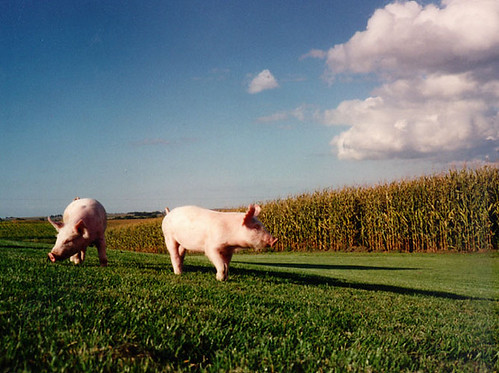What is it about the Hawkeye State that keeps drawing the McCain-Palin campaign back again and again? Is it the state’s renowned culinary delicacies? The tantalizing aroma of industrial pig farms? The seemingly limitless expanses of nothing? Maybe it’s all of the above, because it can’t be because John McCain has the faintest chance of beating Barack Obama when Iowans go to the polls on November 4.

Iowa, pigs, and corn: that pretty much sums it up
McCain was in Iowa on Sunday. When Tom Brokaw of Meet the Press mentioned that he was trailing Obama by 11 points in the latest Iowa poll, McCain, speaking by satellite from Waterloo, remarked: “Those polls have consistently shown me much further behind than we actually are.” That, in fact, has been something of the conventional wisdom regarding McCain’s baffling attraction to Iowa. His internal polls must show a tighter race, the pundits all pundicize, otherwise his appearances in the state, especially at this late stage of the contest, make absolutely no sense.
And indeed, on the surface, there isn’t much logic in the McCain campaign’s Iowa visits. A brief rundown of the GOP candidates’ appearances since the Republican convention reinforces that view:
- September 18: McCain and Palin make a joint appearance in Cedar Rapids. A Survey USA poll published that day has Obama leading by 11 points.
- September 30: McCain speaks at a roundtable of business leaders in Des Moines. A Research 2000 poll published that day has Obama leading by 16 points.
- October 11: McCain holds another “Road to Victory” rally, this time in Davenport. A Survey USA poll published two days earlier has Obama leading by 13 points.
- October 25: Palin makes appearances in Sioux City and Des Moines. A Marist poll published the previous day has Obama leading by 10 points
- October 26: McCain holds a rally in Cedar Falls. At this point, most analysts rate Iowa as “safe” or “favored” for the Democrats.
In fact, McCain has not led in a single published state poll since … well, since ever. If McCain has internal polls which show him as being competitive in Iowa, their margins of error must be plus or minus about 100 points.
It’s not that Iowans have been particularly generous to the McCain-Palin campaign. As of October 27, McCain has raised about $632,000, which is slightly less than half of the amount raised in the state by Obama. By way of comparison, McCain has raised more than ten times that amount in neighboring Illinois, a state that he stands about as good a chance of winning as Iowa, yet he has not made a single appearance in Illinois since the start of the general election campaign. There are, in short, many richer areas of the country where McCain can waste his time.
Nor has McCain been actively stumping for embattled Iowa Republicans in downticket races, despite the urgings of some to abandon any pretense of running for the presidency and, like Bob Dole in 1996, focus on campaigning for GOP congressmen and senators. The only competitive race in Iowa is IA-4, where incumbent Republican congressman Tom Latham is facing a tough reelection contest. McCain, however, hasn’t made an appearance in Latham’s district, and it doesn’t appear that the campaign has bothered to invite Latham to share the stage with McCain or Palin at any of their Iowa rallies. Worse yet, McCain wouldn’t permit GOP senate candidate Christopher Reed to speak at the Cedar Rapids rally or allow IA-1 congressional candidate and local embarrassment David Hartsuch to participate at his Davenport rally.
What, then, explains the irresistible allure of Iowa? Barack Obama, after all, has shown no similar susceptibility to the state’s gravitational pull: he hasn’t been to Iowa since the end of August and has no plans of returning before November 4. For McCain, it all comes down to his severely limited options.
McCain could prevail in the election simply by winning all of the states won by George W. Bush in 2004. Obama, however, has taken the lead in a number of those states, including Iowa, so McCain must poach at least one, and preferably more, of Obama’s blue states in order to get to the magic number of 270 electoral votes. That’s why McCain has spent so much time in Pennsylvania, a state won by Kerry in 2004 and about as likely to go for McCain as Iowa. Pennsylvania, however, is an expensive state in which to run a campaign, whereas Iowa is not. At the beginning of this month, in fact, Iowa was one of the few places where McCain was actually outspending Obama in television advertising.
McCain, in short, needs to campaign in places where he realistically has no chance of winning. So he might as well do it in Iowa, where at least it’s cheaper to lose, than anywhere else. It’s not as if he will win the election by carrying Iowa, but he doesn’t have many better options left. It’s like the old joke: a man is walking down the street one night when he sees a drunk, underneath a streetlight, searching for something in the gutter. “What are you doing?” asks the man. “I’m looking for my wallet,” replies the drunk. “Where did you lose it?” asks the man. The drunk points: “over there, down the street.” “Well, if you lost your wallet down the street, why are you looking for it here instead of there?” “Because the light’s better here,” answers the drunk. For McCain, the situation is similar. On election night, he can say that he didn’t lose the election in Iowa, but at least the light was better there.